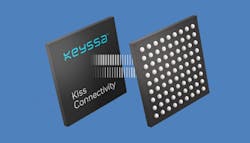Molex to Acquire Keyssa’s 60 GHz Wireless Connector Technology
This article appeared in Microwaves & RF and has been published here with permission.
With mobile and consumer products becoming ever-smaller and thinner, OEMs feel greater pressure to simplify communications within the device itself while enhancing data-transfer speeds.
To that end, Molex has acquired core technology and intellectual property (IP) from Keyssa Inc., a pioneer in high-speed contactless connectors. Keyssa’s wireless chip-to-chip technology, which comes to Molex with over 350 filed patent applications, will complement the company’s push to expand and diversify its micro-connector portfolio with highly flexible, cable-free connectors for near-field, device-to-device applications.
In addition to eliminating the need for physical cables or connectors, the technology acquired by Molex also alleviates concerns over pairing and reliability. Design for manufacturability is also enhanced with fully encased, dust- and water-proof packaging with wide alignment tolerances.
The Keyssa technology operates at data rates up to 6 Gb/s on the 60-GHz band with no Wi-Fi or Bluetooth interference. The tiny, low-power, low-latency, solid-state contactless connectors can solve critical data-transmission needs with minimal overhead.
Molex plans to advance these current capabilities by supporting exponentially higher data rates and full-duplex communications. Additionally, Molex will leverage its signal-integrity expertise and mmWave antenna capabilities to speed the commercialization of new contactless connectors while complementing its existing portfolio of products.
Molex also will take advantage of the Virtual Pipe I/O (VPIO) technology Keyssa developed to resolve protocol inefficiencies. By aggregating low- and high-speed protocols for simultaneous transmission over one or more links, VPIO can help compensate for real-time events that impact link performance integrity. Used in combination, VPIO and contactless connectors can create extensible and efficient I/O that is free from the limitations of mechanical connectors while being capable of adapting and scaling as dictated by application demands.
Molex is ramping a team of more than 25 engineers in the U.S. and India to develop next-generation products based on this technology. Initially, the focus will be on the unique connectivity needs of high-volume mobile applications where contactless connectors offer potential benefits in design for manufacturing, serviceability, reliability, signal aggregation, and security.
Over time, Molex will apply this technology to address emerging application areas, encompassing smart factories, automotive advanced safety, medical robotics, and more.

